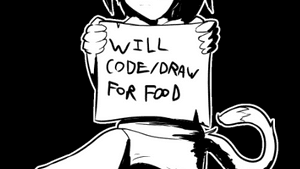Stay in the Loop
BSR publishes on a weekly schedule, with an email newsletter every Wednesday and Thursday morning. There’s no paywall, and subscribing is always free.
And the geek shall inherit the Earth
Tom Purdom on income inequality and the creative class

In the 1970s, Gene Wolfe, one of the grandmasters of modern science fiction, made a prediction I’ve carried in my head for 40 years. Wolfe liked to study his audience by eavesdropping in the science fiction sections of bookstores. He concluded that science fiction attracted readers who belonged to a new class, and he believed this new class was going to dominate the 21st century the way the middle class dominated the 20th.
His prediction seems to be coming true. Economists have even invented a name for this new class: It’s the “creative class,” and they argue it’s become our primary source of prosperity. City and state governments have decided they’re onto something, and set up agencies such as Philadelphia’s Office of Arts, Culture, and the Creative Economy.
The new class has already become so important you can detect a change in popular attitudes. Forty years ago, “geek” was a contemptuous epithet. Today, it’s an ironic, somewhat bemused term of respect.
Jobs created jobs
The public now recognizes that geeks are the source of developments such as smartphones and GPS. Geeks are Steve Jobs, Bill Gates, Mark Zuckerberg. They can make lots of money and become celebrities, two attainments Americans always respect. When Geekadelphia named me Geek of the Week two years ago, some in the classical music community seemed puzzled, but most of my friends considered it an accolade.
If the creative class really is dominating the 21st century, its rise should be taken into account when we debate current social issues. Is it possible that the emergence of the creative class may be responsible for some of the rise in inequality?
Inequality has always been one of the primary characteristics of the creative life. In business, some risk-taking buccaneers win fortunes. Others go bankrupt or drift to the sidelines when they discover nobody wants their new app.
Little room at the top
Inequality is especially acute in the arts. Cellist Yo-Yo Ma’s fee is reported to be $50,000. When he solos with the Philadelphia Orchestra, the musicians who accompany him make about five percent of that. The highest-paid member of the orchestra, concertmaster David Kim, receives about 15 percent of Ma’s fee.
Gaps are just as great in the literary sector. Philadelphia’s leading science fiction writer, Michael Swanwick, recently posted a blog item that summed up the realities of a writing career: “There are a small number, such as George R. R. Martin, and Stephen King, and Neil Gaiman, who get pretty much all the money they deserve (and rightly so). Then there's a larger but still scandalously small number, such as myself, who make an okay living out of it. And then there are the vast majority of writers who will never come close to being able to quit their day jobs but keep plugging away in the hope that someday they'll break big.”
Most writers I know seem to accept steep inequality. Yo-Yo Ma and Stephen King make big money because they command big international audiences. No government program can change that.
But, as Swanwick says, those on the bottom don’t switch to an occupation that will bring in more money. Instead, they find some way to stay in the game.
Juggling work, making ends meet
Some do it with day jobs. Others subsidize their careers with higher-paying hourly jobs within their field. One of Philadelphia’s multiple-Barrymore-Award-winning actors, Grace Gonglewski, supports her stage work with commercial voiceovers. A Jewish mezzo I know was a long-time paid soloist in a Presbyterian church.
Economists base their theories on the behavior of an “Economic Man,” who always tries to maximize his income. Those theories start to fall apart when predicting the behavior of creatives. Many on the bottom may hope they’ll get a big payday, but I think most keep at it because they value the satisfactions they get from the work itself. If the creative class really is growing, people with that kind of attitude are becoming more common.
Could that be one of the reasons our current political situation seems so confused? Republican and Democratic candidates are both appealing to voters with traditional, middle class, nine-to-five ambitions. How do they sound to someone who’s holding down a part-time writing job and juggling three freelance assignments at a time?
A Worldwide creative web
Has anyone asked how creatives react when politicians fulminate against foreign competition? Musicians, writers, and most other creatives operate in a global market. American writers routinely compete against translations of books by foreign writers. Many of us discover early in our careers you don’t have to be a big name to receive checks for foreign translations of your own works. The magazines and anthologies that carry my science fiction can now boost their circulation by selling electronic copies worldwide.
I’m not a sociologist. I can’t offer statistics that prove the rise of the creative class is already changing the nature of the U.S. labor force. I just know I’m a bona fide taxpaying member of the creative class, and I’m discovering much of today’s political rhetoric sounds increasingly irrelevant.
Sign up for our newsletter
All of the week's new articles, all in one place. Sign up for the free weekly BSR newsletters, and don't miss a conversation.

 Tom Purdom
Tom Purdom